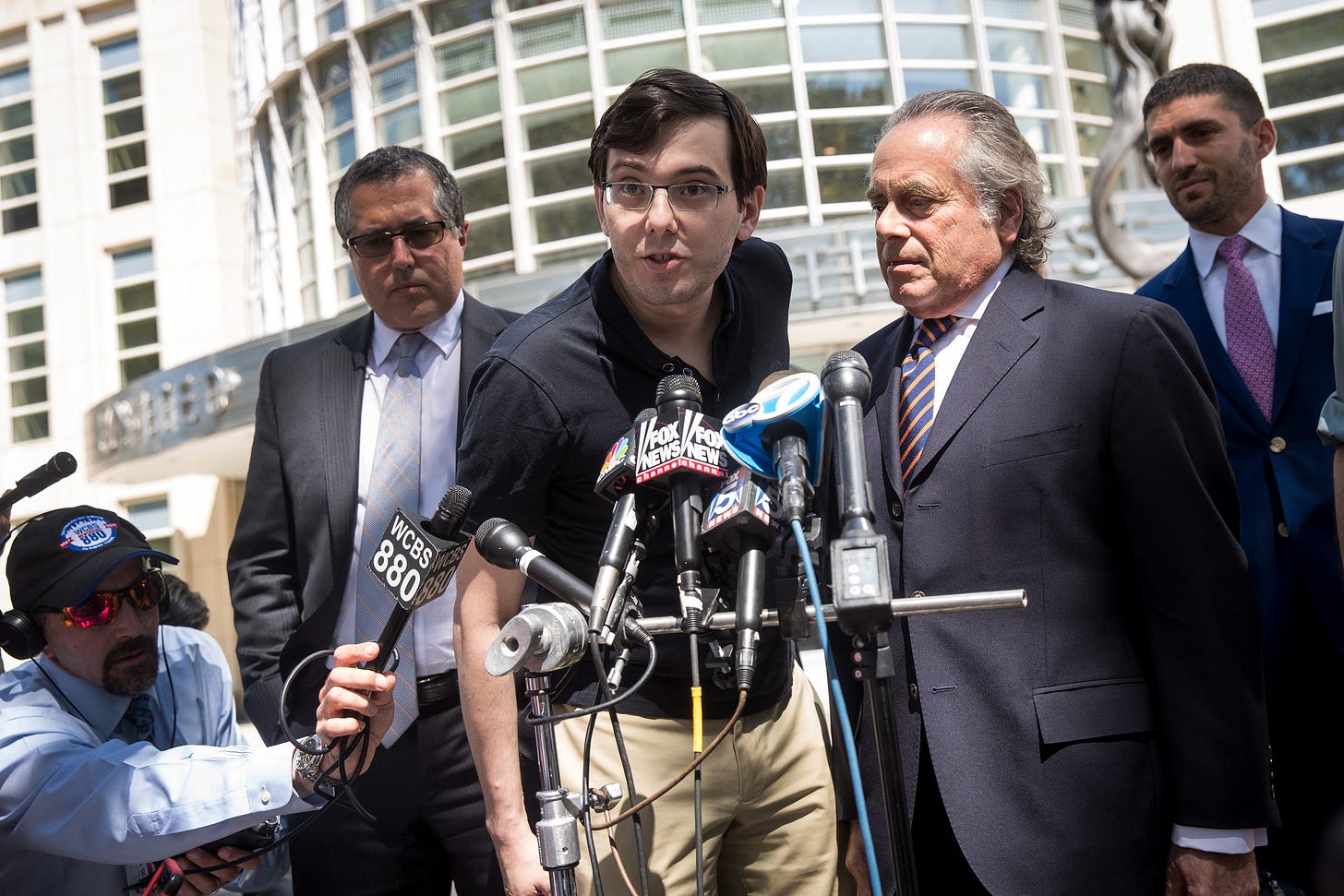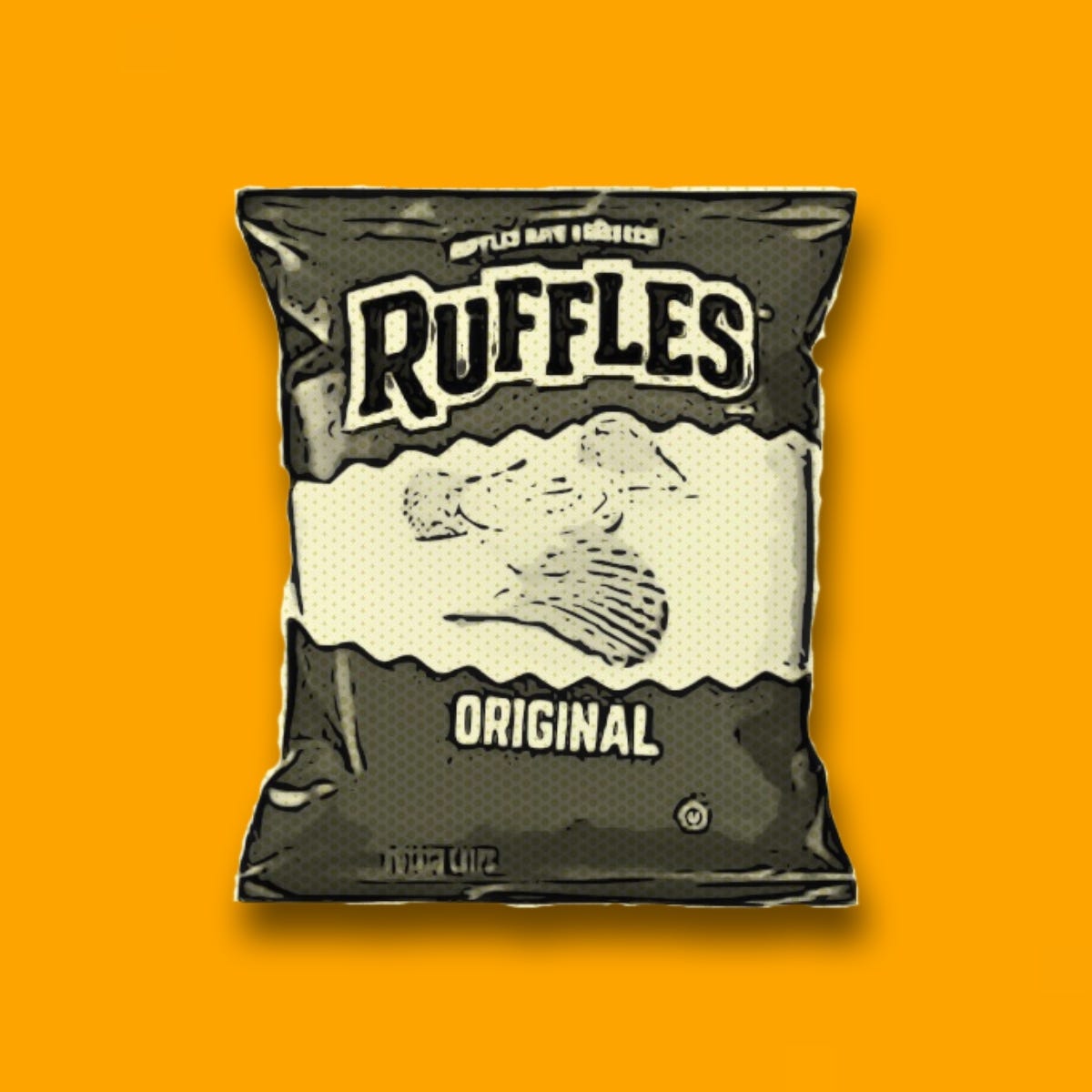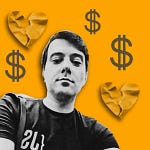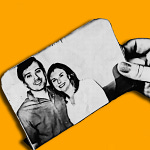Contrary to what much of the peanut gallery on the internet was predicting, jurors in Martin Shkreli’s securities fraud case in the summer of 2017 did not rush to convict him as soon as they had the chance. After closing arguments in late July, they spent almost the entire first week of August deliberating in the Brooklyn federal courthouse.
Martin stood accused of eight crimes. He ended up convicted of only three: two having to do with lying to investors in his hedge funds, which he had essentially admitted to me that he had done; and one having to do with manipulating the price of Retrophin stock, which was linked to him stalking and harassing the wife and children of a former employee, Tim Pierotti.
Given he was a person the internet loved to hate, he was routinely described in the press with vividly negative adjectives, and some prospective jurors had called him a “snake” and a “greedy little man” on first sight, it was a remarkably fair and reasonable verdict. In a sense, it was a victory for the defense. Martin was particularly pleased that jurors acquitted him of a count alleging he stole from his drug company Retrophin — he had always maintained that his creative “fixes” for repaying his investors were legit.
Even though he was still facing as long as 20 years in prison on the charges he was convicted of, he was elated. His display of near-giddiness confused most of the journalists watching him.
“This was a witch hunt of epic proportions,” he declared to a crowd of journalists outside the courthouse. His lead lawyer, Benjamin Brafman, stood beside him, alternating between looking pleased and pained as Martin kept going overboard with hyperbole. “And maybe they found one or two broom sticks. But at the end of the day, we’ve been acquitted of the most important charges.”
Well, they were the most important charges to him, anyway.

Days later, when reporters tracked down jurors, and they apparently realized whose fate they had been deciding (the guy who jacked up drug prices), some regretted their choices and claimed they had been “bullied” by other jurors. (The “bully” they were likely referring to, a former Con Edison procurement specialist named Lois Pounds, came across as strikingly thoughtful and even-handed in her interview with the New York Times, compared with the angry jurors popping off anonymously to the Daily Beast.)
Astoundingly, it seemed the legal process, and Judge Kiyo Matsumoto’s meticulous sifting through the jury pool, had worked. Public prejudice did not determine the outcome of the case. The facts and testimony presented in the court did — with maybe a little help in Martin’s corner from his lawyer Brafman.
As demoralizing as it is to endure repeated failure and rejection in a role like, say, telemarketing, I can only dimly imagine the psychic wounds regularly inflicted on criminal defense lawyers.
A telemarketer invests little time and no significant effort when they try to make a sale. A defense lawyer might invest months or years or their life in a case before ultimately getting crushed. And they get crushed a lot — defendants are acquitted in just 14 percent of federal criminal jury trials, with the odds typically not much better at the state level.
Big shot defense lawyers like Brafman who specialize in representing the rich and infamous make good money. But losing is still no fun, even if you’re paid well for it. Losing over and over again, as criminal defense lawyers inevitably do, and still bringing 100 percent of your brain power and energy to court, takes an astonishing level of resolve. Luckily for Martin, Brafman had that resolve.
(As an aside: I’m not being generous to Brafman here because of any level of affection — he has indicated many times that he considers me a nuisance.)
Martin didn’t testify — Brafman wisely recognized his client was a walking PR disaster and would probably do no better for himself on the witness stand. Martin also put up very little evidence and few witnesses in his defense.
Martin told me that many witnesses who would have otherwise spoken up for him were scared off by the threat of being indicted. His close friends and business associates, Marek Biestek and Kevin Mulleady, for instance had been described by the prosecutors as “co-conspirators,” but neither was arrested or charged…or called to testify by either side.
Instead, it was up to Brafman and his team over the course of the six-week trial to engage in tough cross examination and elicit counter-narratives. It was a heavy lift, but they did it admirably.
Brafman managed to force some witnesses to stumble and contradict themselves, eroding their credibility. And his partner Marc Agnifilo coaxed complex views of Martin out of witnesses, including making former Retrophin chairman Steve Richardson blush a deep purple by confronting the wealthy gay man with an email in which he revealed obvious sexual attraction to the cash-strapped young CEO.
Lead prosecutor Jacquelyn Kasulis, a woman of formidable intelligence and ambition, made it clear in her closing argument how much of a problem Brafman’s tenacious advocacy was for her by laying into him aggressively.
“I submit to you that the evidence in this case is devastating for the defendant,” she told the jurors. “Mr. Brafman had to make up evidence or skew evidence. Because when you don’t have the law and you don’t have the facts on you resort to distractions.”
She continued: “There is an avalanche of evidence in this case. And I don’t use that term lightly. An avalanche that buries the defendant….Mr. Brafman spent a lot of time talking about the mythological Martin Shkreli.
“Let’s talk about who is Martin Shkreli. What does the evidence show you? It has shown you that Martin Shkreli is calculating. It’s not just about the sheer volume of lies, it’s the kind of lies that he tells about things that really matter to people, to investors, that would matter to a reasonable person making a decision about how to invest their money.”
And she went on: “Let’s consider the evidence, ladies and gentlemen. Of course Mr. Shkreli is a smart man, no one is saying he’s not smart. He knew exactly what he was doing. He intended to deceive. He intended to defraud these investors by lying to them.” (Those words were, not-so-coincidentally, exactly what the prosecutors needed to prove to win on some of the charges.)

What had Brafman said in his closing that caused her to dwell on him and his characterizations so much? He had painted Martin as an eccentric savant, pointing out that some witnesses had described him as “Rain Man,” and called him a “visionary.” Brafman noted that Martin had lived modestly, sleeping at times in his office, and rarely spent much money on himself. (This was mostly true, apart from the $2 million Wu-Tang Clan album, which went unmentioned during the trial.)
“He’s not a Ponzi guy who takes the money and is buying Cadillacs and yachts,” the lawyer insisted.
And, while holding up a bag of Ruffles potato chips as a prop, he implored jurors to think through the realities of capitalism and entrepreneurship.
“This bag of potato chips doesn’t just show up downstairs in the concession stand so that we can buy it and we can enjoy it,” he said while waving the bag. “Somebody made that bag of potato chips, and if somebody has to go through so many hoops just to get the chips here, think about it tonight when you go home…he did a pharmaceutical company from nothing to production. And that’s why he lived in a sleeping bag like a hermit in his office for two years.”
Although it didn’t win the trial overall, the bag of chips may have scored a few points.
After the verdict was read on Aug. 4, 2017 — a Friday that had started off rainy but gave way to sunshine by the afternoon — Martin’s face overwhelmingly looked relieved. I could tell he was thinking that at least that part was over. I rode back down in the elevator to the ground floor with Martin and his lawyers. Martin and I gave each other a quick one-arm-around-the-shoulders hug.
Back outside, as Martin was blasting the press with his foolish bravado, I thought back to Kasulis and her closing. How strange and frustrating it must have felt for her to have to try to persuade people that Martin Shkreli, already convicted in the court of public opinion many times over, was a bad person. But that was how the justice system was actually designed to work, even if it so rarely ever did.














